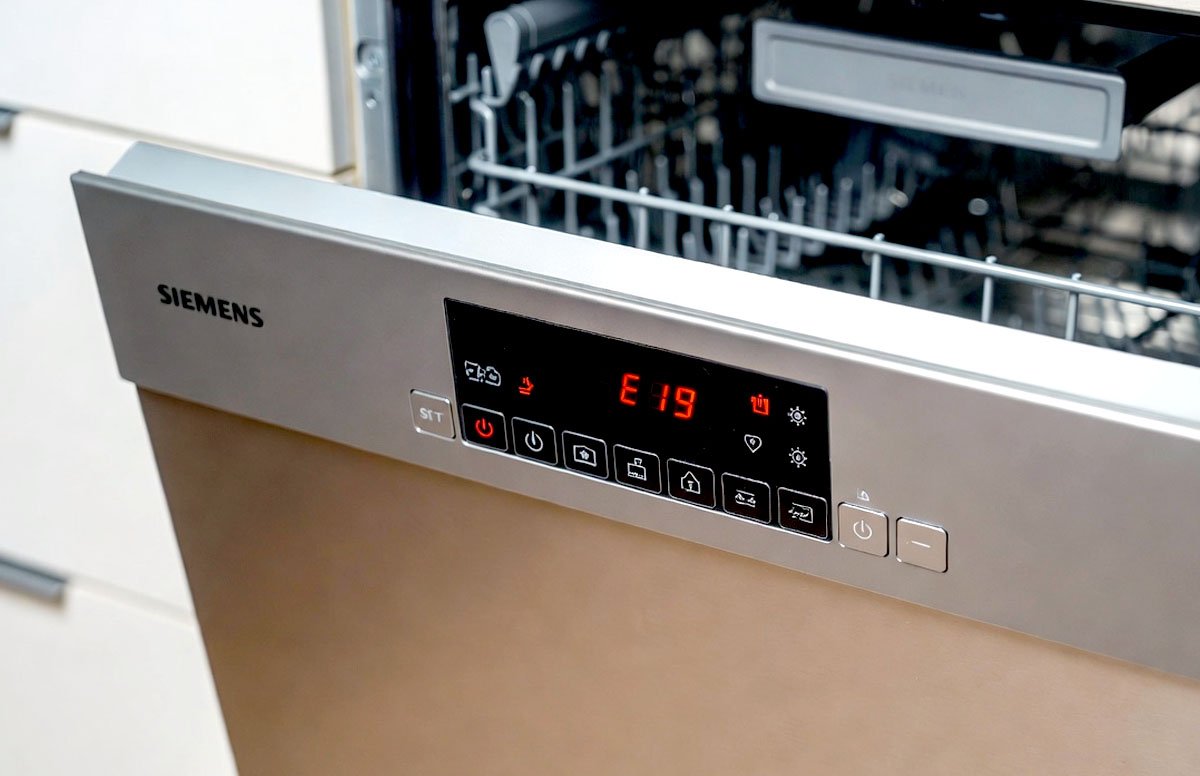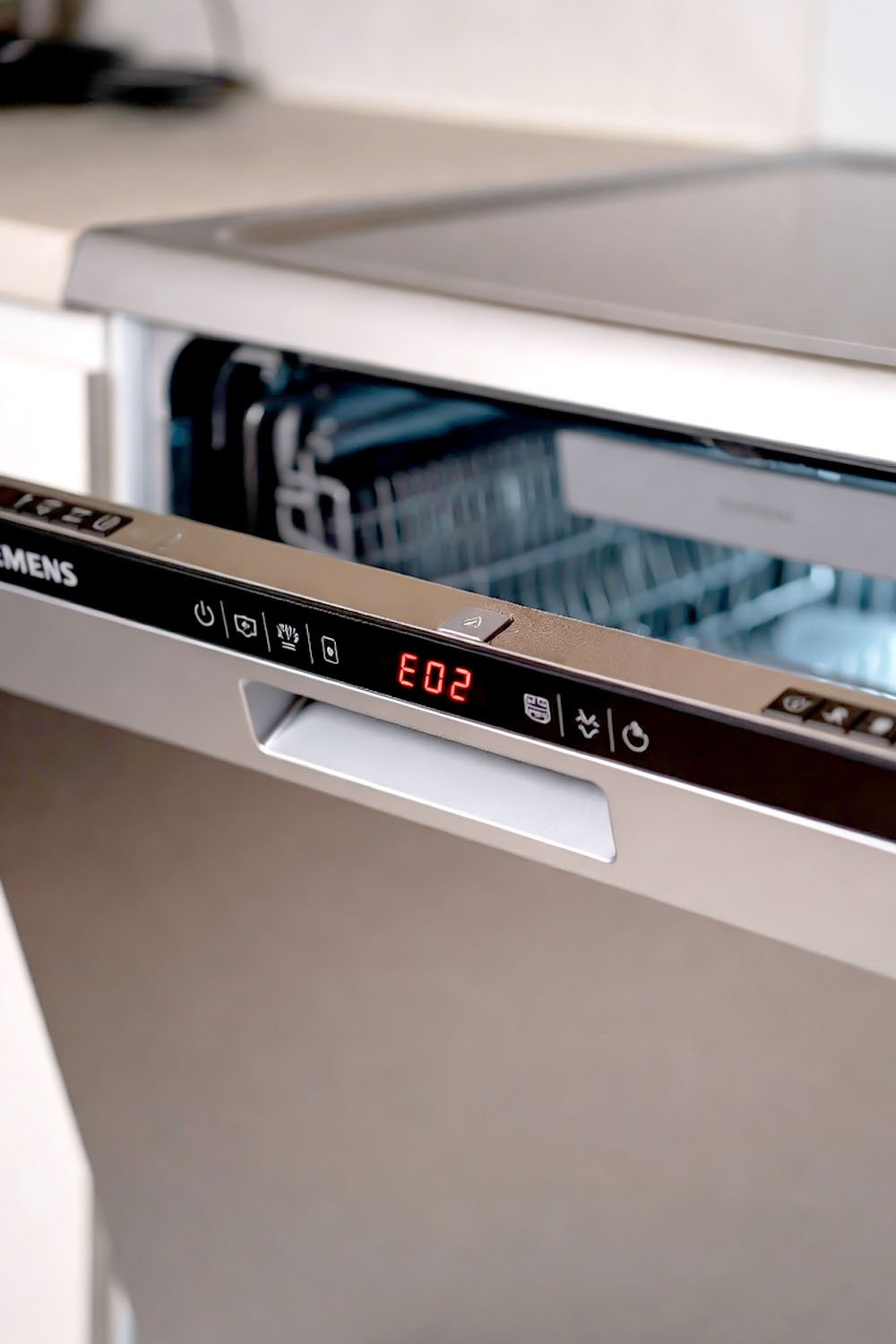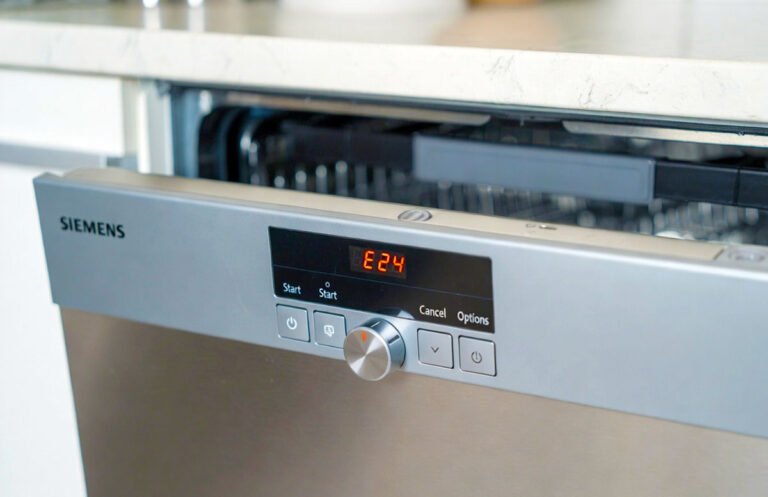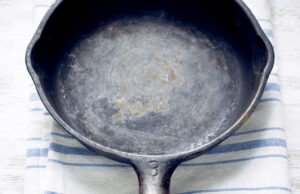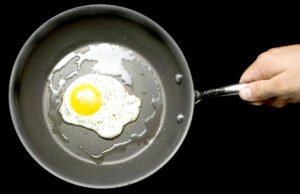As an Amazon Associate, I earn from qualifying purchases at no extra cost to you.
Why Does My Dishwasher Smell Like Sewer? Causes and Fix It
You’ve just opened your dishwasher after a long day, ready to unload sparkling clean dishes, but suddenly, a horrible sewer-like smell hits you right in the face. Yuck! That stink can make you want to run far away from your kitchen. You’re not alone. Many people wonder why their dishwasher smells like a sewer, even when they clean it regularly. The good news is that this problem is common and fixable. Let’s dig deep to find out why your dishwasher smells this way and what you can do to stop it for good.
Why Does My Dishwasher Smell Like Sewer? Understanding the Causes
The sewer smell coming from your dishwasher can be really gross and confusing. After all, your dishwasher is supposed to clean things, not stink! To fix this problem, you need to know what causes it in the first place. Several things can make your dishwasher smell like a sewer.
1. Food and Grease Build-Up
When you use your dishwasher, tiny food bits, grease, and oils can get stuck in the dishwasher’s filter, drain, or spray arms. Over time, these bits start to rot and cause bad smells. This food build-up is the most common reason for the stinky smell. Even if you rinse your dishes before loading, small leftovers still find their way into the dishwasher’s hard-to-reach places.
2. Dirty Dishwasher Filter
Your dishwasher has a filter designed to catch food particles and stop them from going down the drain. If you don’t clean the filter regularly, it becomes clogged and dirty. A dirty filter traps smelly food scraps, which begin to rot and create a sewer-like smell. Cleaning the filter every few weeks is very important to keep odors away.
3. Clogged or Slow Drain
If the dishwasher drain is clogged or slow, dirty water can sit inside the dishwasher. This dirty water becomes a perfect place for bacteria and mold to grow, creating a terrible smell. The clog might happen because of food, grease, or even soap scum blocking the pipes.
4. Garbage Disposal Issues
If your dishwasher is connected to a garbage disposal, a problem there could cause the smell. Sometimes the disposal gets clogged or dirty, and the bad odor can travel back into the dishwasher. This is especially true if the disposal has a clog or the trap under the sink is dry.
5. Dry P-Trap or Air Gap Problems
Your dishwasher’s plumbing has a P-trap, a U-shaped pipe that keeps sewer gases from coming back up into your kitchen. If this trap dries out because you don’t use your dishwasher often, sewer gases can leak up and cause the smell. Similarly, an air gap device can also get clogged and cause odors to come back inside.
6. Mold and Mildew Growth
Because dishwashers are warm and wet, they can become a perfect place for mold and mildew to grow. Mold gives off a musty, bad smell that might remind you of a sewer. Mold can grow around the door seals, inside the dishwasher’s tub, or in any damp parts.
7. Old or Broken Dishwasher Parts
Sometimes, old or broken dishwasher parts like door seals, hoses, or filters may cause leaks or traps not working well. This can let smells escape or cause standing water where bacteria grow. If your dishwasher is very old or not working right, that could be the reason for the stink.

How to Clean and Fix a Sewer Smell in Your Dishwasher
Now that you know why your dishwasher smells like a sewer, it’s time to learn how to clean and fix it. Don’t worry, most fixes are easy and you can do them yourself at home.
Step 1: Clean the Dishwasher Filter
Start with the dishwasher filter. Remove it from the bottom of your dishwasher — usually, it just twists out. Wash the filter with hot water and dish soap using a soft brush. Make sure to remove all food particles and grease. Cleaning the filter once every week or two keeps your dishwasher smelling fresh.
Step 2: Clear the Drain and Drain Hose
Check the dishwasher drain and drain hose for clogs. Sometimes food and soap gunk build up and block the flow. You can disconnect the drain hose and rinse it with warm water. Use a flexible brush or pipe cleaner to remove stubborn debris. Also, make sure the sink drain and garbage disposal are clear if connected.
Step 3: Clean the Dishwasher Tub
Next, clean the inside of the dishwasher tub. Mix one cup of white vinegar with hot water and pour it into a dishwasher-safe cup on the top rack. Run a hot water cycle without any dishes. Vinegar helps break down grease and kills bacteria that cause smells.
For extra cleaning power, sprinkle baking soda on the bottom of the dishwasher and run a short hot cycle. Baking soda deodorizes and removes stains.
Step 4: Clean Door Seals and Spray Arms
Don’t forget the door seals and spray arms. Use a cloth soaked in vinegar or mild detergent to wipe down the rubber seals around the door. This will remove mold and mildew. For spray arms, check for tiny holes clogged with food. Use a toothpick or small brush to clear them.
Step 5: Check the Garbage Disposal and Air Gap
If your dishwasher connects to a garbage disposal, run the disposal to clear any clogs and smells. You can also clean the disposal with vinegar or baking soda. Make sure the air gap (a small cylinder usually next to the faucet) is clean and not blocked.
Step 6: Keep the P-Trap Filled with Water
To stop sewer gases from coming back up, make sure the P-trap under your sink always has water in it. If you don’t use your dishwasher often, run water through it regularly to keep the trap wet.
Step 7: Regular Dishwasher Maintenance
Prevent future smells by regularly cleaning the filter, running vinegar and baking soda cycles, and wiping down door seals. Also, scrape large food pieces off dishes before loading. Avoid overusing dishwasher detergent, which can cause soap build-up.
How to Prevent Sewer Smell in Your Dishwasher Long-Term
Fixing the smell once is great, but what about keeping it away forever? Here are some tips to prevent sewer smells in your dishwasher for the long term.
Keep Food Out Before Washing
Make it a habit to scrape and rinse plates before loading. Even tiny food pieces cause build-up and smells. Use a small sink strainer to catch food when washing by hand.
Use the Right Dishwasher Detergent
Use good quality dishwasher detergent and don’t put too much. Too much detergent leaves soap scum, which traps food and bacteria. Powder detergents sometimes work better than pods if you have smell problems.
Run Hot Water Before Starting Dishwasher
Run hot water in your kitchen sink before starting the dishwasher. Hot water helps the dishwasher fill with warm water right away, improving cleaning and helping flush out grease and food.
Use Dishwasher Cleaner Monthly
Use a commercial dishwasher cleaner or natural cleaners like vinegar and baking soda every month. This removes build-up in hard-to-reach places and keeps your machine fresh.
Leave Dishwasher Door Open to Dry
After a cycle, leave the dishwasher door open for a while to let it dry. A wet dishwasher is a breeding ground for mold and smells.
Check and Replace Old Parts
If your dishwasher is old or has broken seals, hoses, or filters, replace them. Old parts can cause leaks and allow smells to escape.
Avoid Standing Water
Never leave dirty water standing in your dishwasher for a long time. Always run the dishwasher regularly or drain it if you’re not using it.
Call a Professional if Needed
If you try all these tips and still have sewer smells, it might be time to call a plumber or appliance expert. Sometimes the problem is deeper in the plumbing or the dishwasher needs a major repair.
Final Thoughts
A dishwasher that smells like a sewer is unpleasant, but with some simple cleaning and maintenance, you can fix it quickly. Most bad smells come from food build-up, clogged drains, or mold growth. By cleaning the filter, drains, and seals regularly, and using natural cleaners like vinegar and baking soda, you can keep your dishwasher fresh and smelling good. Remember, prevention is better than cure, so keep an eye on your dishwasher and treat it well. Soon, that awful smell will be a thing of the past, and your kitchen will stay fresh and clean.
Frequently Asked Questions (FAQs)
Is it normal for a dishwasher to smell like a sewer sometimes?
Yes, it can be normal sometimes, especially if food or grease builds up inside the dishwasher. This happens because tiny food bits get stuck and start to rot, causing a bad smell. It can also happen if the dishwasher filter or drain gets clogged. The good news is that you can clean these parts easily to stop the smell. If the smell happens often, it means you should clean the dishwasher more regularly or check the plumbing connected to it.
Can a dirty dishwasher filter cause a sewer smell?
Absolutely! The dishwasher filter traps leftover food particles during washing. If it is dirty and not cleaned often, those trapped bits rot and smell like sewage. Cleaning the filter every week or two can help a lot. To clean, remove the filter, rinse it with warm water, and scrub with a soft brush if needed. A clean filter helps the dishwasher drain properly and keeps bad odors away.
Do I need to clean my dishwasher with vinegar to remove the smell?
Using vinegar is a great and natural way to clean your dishwasher and remove smells. Vinegar helps break down grease, kills bacteria, and dissolves soap scum inside the dishwasher. You can put a cup of white vinegar in a dishwasher-safe container on the top rack and run a hot cycle without dishes. Doing this once a month helps keep your dishwasher fresh and free of bad smells.
Is it possible that the garbage disposal is causing the dishwasher smell?
Yes, if your dishwasher is connected to a garbage disposal, it can cause smells. The disposal may have food stuck inside or be clogged, which lets bad smells travel back into the dishwasher. Running the disposal, cleaning it with baking soda and vinegar, or clearing any clogs can help fix this problem. If the smell continues, check the disposal and the connecting pipes for issues.
Can mold or mildew in the dishwasher cause a sewer-like smell?
Yes, mold and mildew love warm, wet places like dishwashers. They can grow on door seals, inside the tub, or around spray arms. Mold gives off a musty or sewer-like smell. To prevent this, wipe down door seals regularly, run cleaning cycles with vinegar or commercial cleaners, and keep the dishwasher dry by leaving the door open after use.
Do I need to run hot water before starting the dishwasher to prevent smells?
Running hot water in your sink before starting the dishwasher is a smart trick. It makes sure the dishwasher fills with hot water right away, which cleans dishes better and helps flush out grease and food particles. This prevents build-up that can cause smells. Running hot water before starting your dishwasher is a simple step that helps keep everything fresh.
Is a dry P-trap responsible for sewer smells in the dishwasher?
Yes, the P-trap under your sink stops sewer gases from coming back into your kitchen. If it dries out, especially if you don’t use your dishwasher often, these gases can escape and smell like sewage. To fix this, run water in your sink or dishwasher regularly to keep the P-trap full. If the smell persists, check if the plumbing or trap needs repair.
Can old dishwasher parts cause a sewer smell?
Old or broken dishwasher parts like seals, hoses, or filters can cause leaks or let smells escape. If seals are cracked, water and bacteria can collect and rot, causing bad odors. Replacing worn parts keeps the dishwasher working well and smelling fresh. If your dishwasher is very old, it might be time for an inspection or replacement to solve persistent smells.

